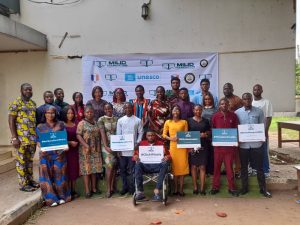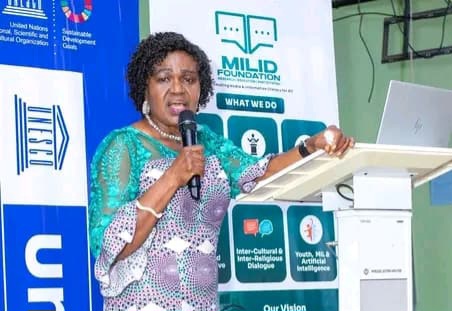Lawrence Nwimo, Awka
Renowned professor of communications, Professor Chinyere Okunna, has emphasised the urgent need for a new approach to conflict management in Nigeria, citing the increasing complexity and protracted nature of conflicts in the country.
Prof. Okunna made this assertion in Awka, while delivering a keynote address at a 3-day workshop themed: “MIL in Youths Organisations.”
The event was organsed by MIL Intercultural Dialogue Foundation (MILID), in collaboration with United Nations Educational, Scientific and Cultural Organisation (UNESCO), and Anambra State Government.

The workshop brought together over 30 youths from diverse youth-led organisations across the South-East; and trained participants on tackling gender-based violence, how to evaluate information, identify biases, and recognise the warning signs of misinformation.
Okunna, who spoke on “MIL and Conflict Management in South-East,” said the traditional methods of conflict management currently practiced in South-East and Nigeria at large have proven inadequate in addressing the root causes of conflicts.
“We have a very profound yearning and desire for peace in our region, like other parts of Nigeria. The old method of crisis management may no longer be enough because many of these conflicts depend on media portrayals which are intensified by the rapid dissemination of information, particularly online.
“Many conflicts in the South-East have been magnified by misinformation, propaganda and manipulation of ethnic and religious sentiment through various media, particularly social media, where people share unverified information without first confirming at least the source of such information,” she said.
Okunna, who is the first female professor of Mass Communication in Sub-Saharan Africa and current deputy Vice-Chancellor (Academic) Paul University Awka, said misinformation and fake news have been a significant contributor to societal tension.
According to her, the emergence of artificial intelligence and the quest to amass wealth through online posts have made some people very desperate to magnify information to get ‘clicks’ and ‘likes’ even when the sources are false and misleading.
She further expressed her concern that current media contents generated by youths focus more on sensational topics like infidelity, rather than highlighting achievements and successful marriages. She stated that as a developing country, positive news and contents should make headlines, not just the negatives.
Describing Media literacy as the way forward and strong tool for mitigating conflicts, she urged bloggers and social media influencers to endeavour to provide balanced perspective on controversial issues and use language that is reductive instead of magnifying tension. She also charged them to centre content on promoting peace and integration, instead of taking extremist positions.
Okunna commended MILID Foundation for training youths of the region on media literacy, and charged participants to apply the knowledge garnered in creating contents that will not inflame issues.
She also urged them to form a frontier to combat proliferation of fake news, propaganda and misinformation ravaging the South-East, adding that the frontier must be defined not by the traditional purpose but by information flows and media narratives.
She urged them to leverage traditional media structures and collaborate effectively with other institutions to create a bridge of trust between the new media and the traditional information system to restore sanity in the media space.
In a remark, Commissioner for Information, Dr Law Mefor, expressed worry about the high rate of sensuality in social media. He urged youths to shun creating pornographic contents, propaganda and fake news, warning that they have potential to set the state and country on fire.
The State Commissioner for Education, Prof Ngozi Chuma-Udeh, represented by Obioma Okeke, commended MILID for the training and encouraged participants to leverage the opportunities in digital space to be productive in years to come.
Dr. Chido Onumah, Co-Founder of MILID Foundation, said one of the things MIL helps citizens to do is to know how to access information that is accurate. He urged participants to apply their newfound knowledge to their works to address societal anomalies and combat misinformation, which he described as a major challenge of the present century.
Earlier in a goodwill, Acting Vice-Chancellor of Nnamdi Azikiwe University, Awka, Prof Joseph Ikechebelu, represented by Chiamaka Okafor, said the theme of the workshop is germane to the wellbeing of the individual and society.
Representative of UNESCO, Yachat Nuhu, in a remark, said the shared vision of UNESCO was to empower young people with the knowledge and skills they need to navigate the increasingly complex information landscape.
She also said the workshop aligns with a commitment of UNESCO to promote freedom of expression and access to information which formed an integral part of attaining the sustainable development goals.

